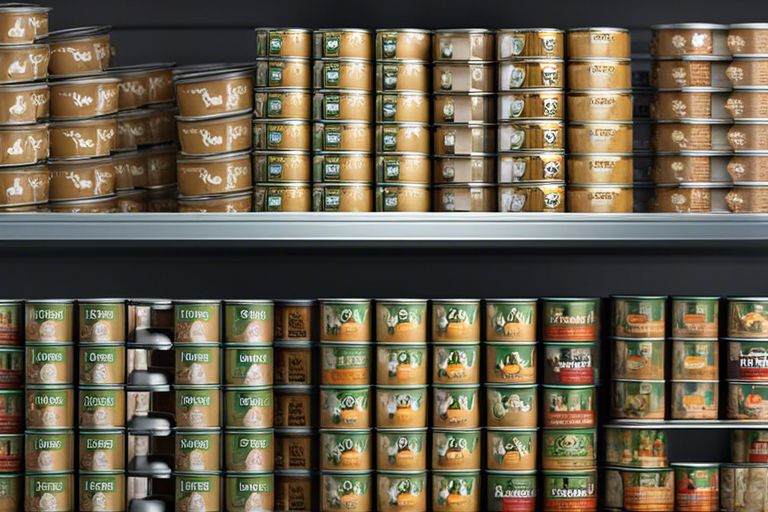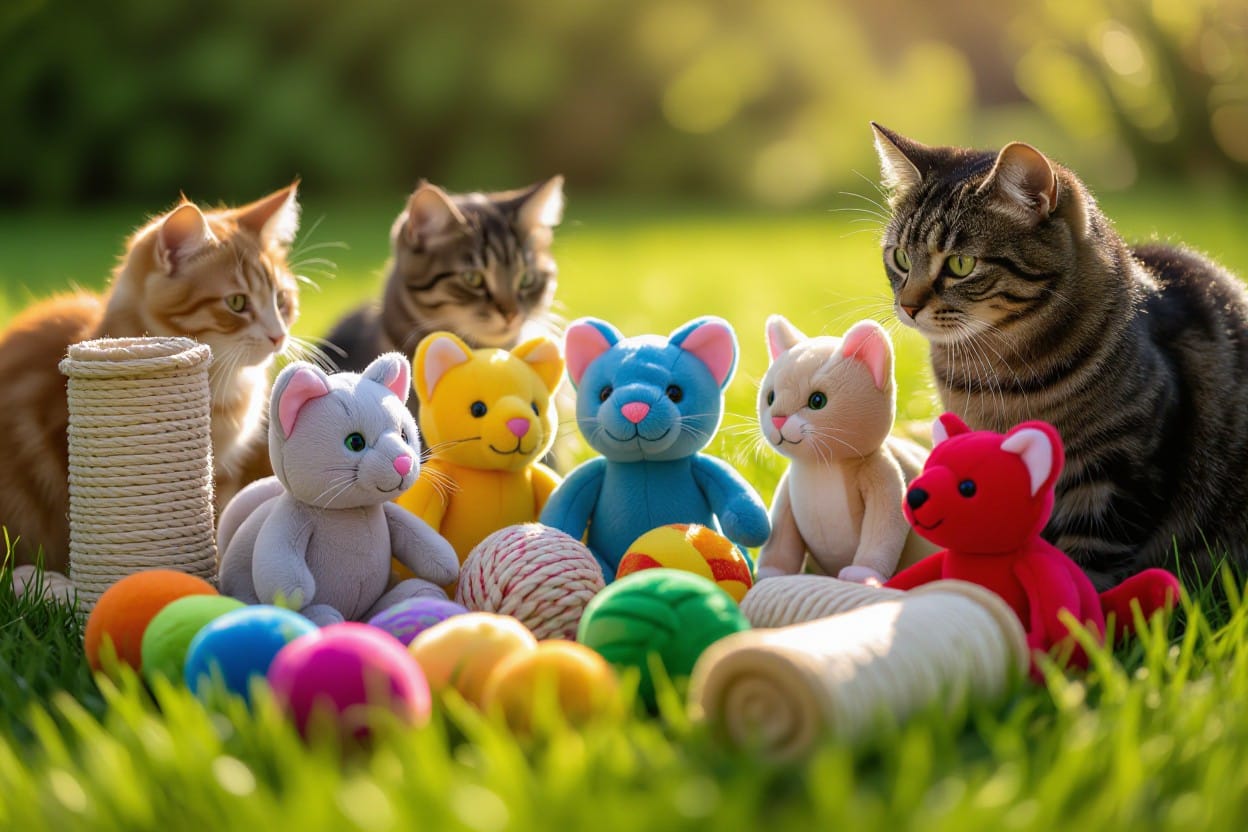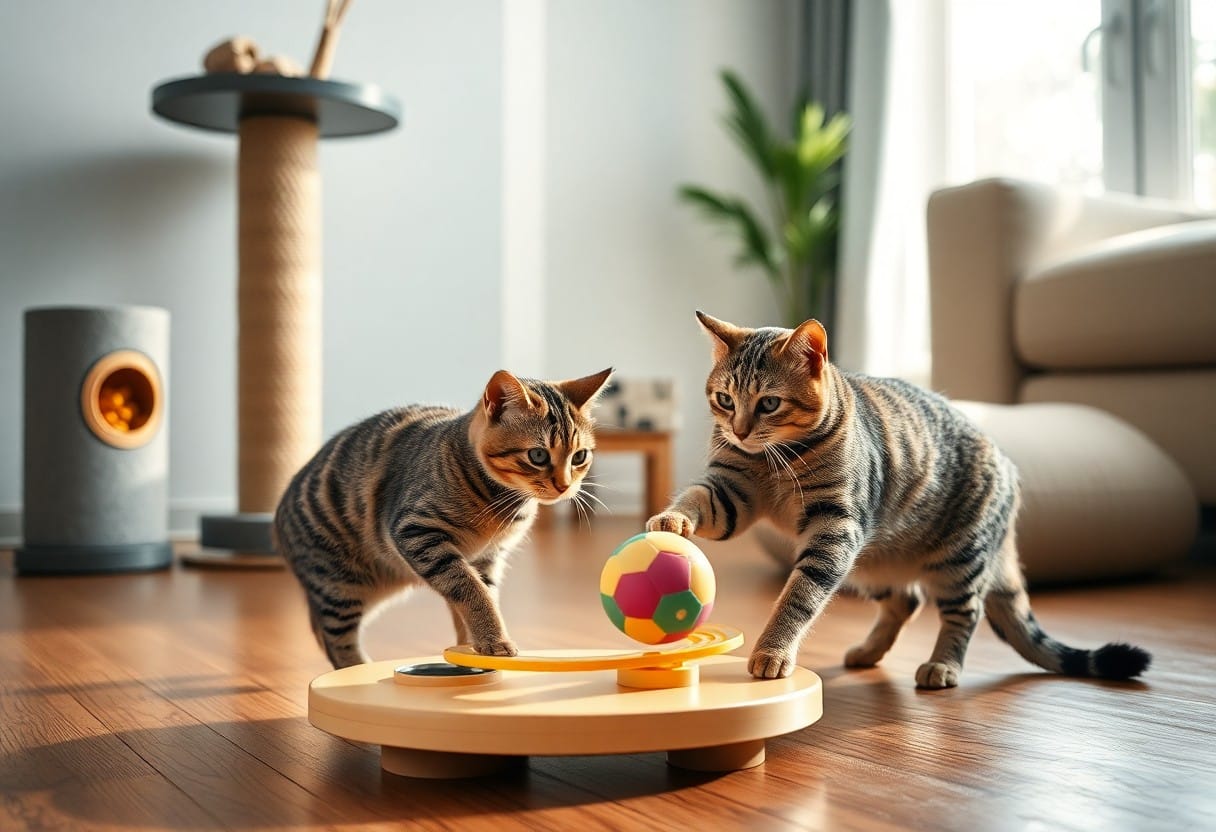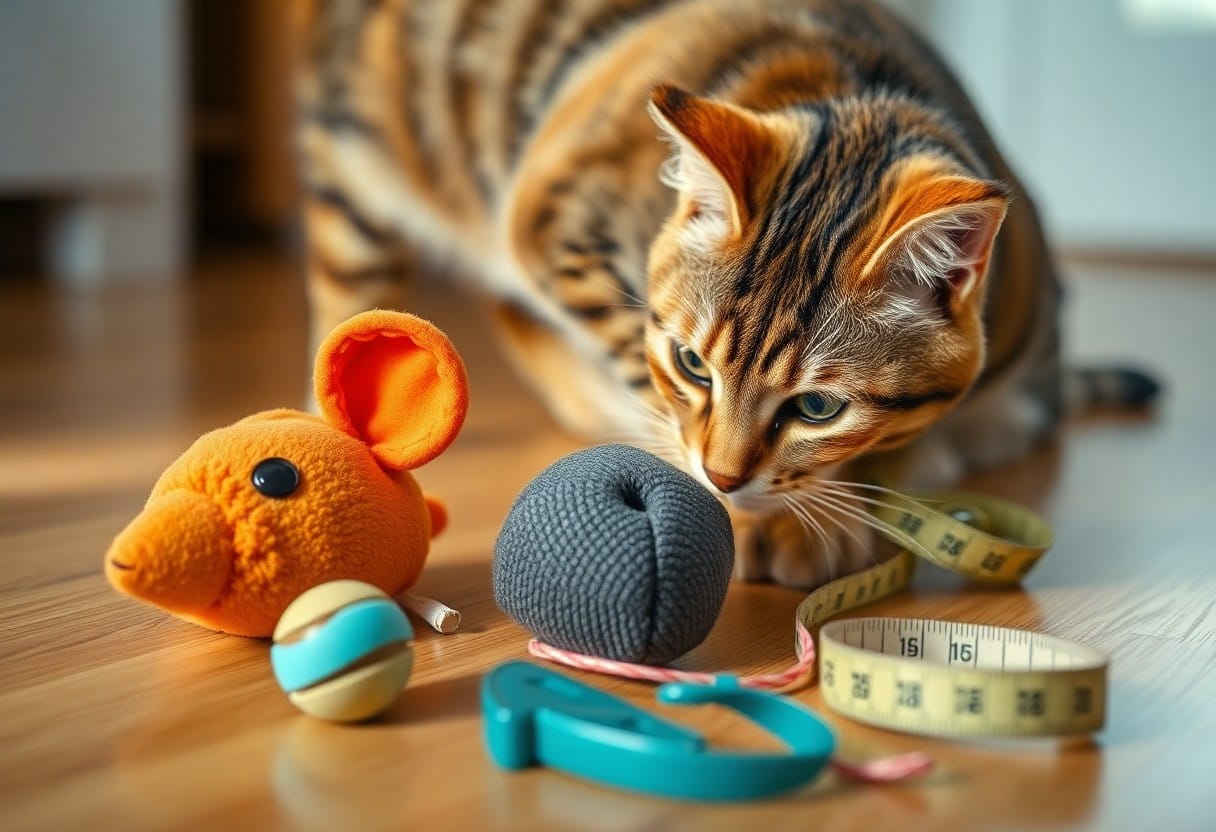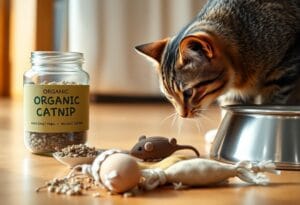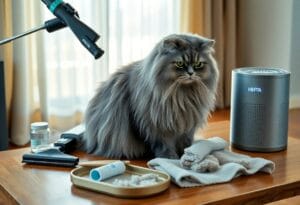Just like humans, cats require a balanced diet to stay healthy and active. As far as choosing the right food for your feline friend, it’s crucial to opt for brands that are not only delicious but also nutritious. To make your decision easier, we have compiled a list of the top five cat food brands that come highly recommended by veterinarians. These brands have been carefully selected for their quality ingredients, balanced nutrition, and overall positive impact on cats’ health. Keep reading to discover the best options for your furry companion!
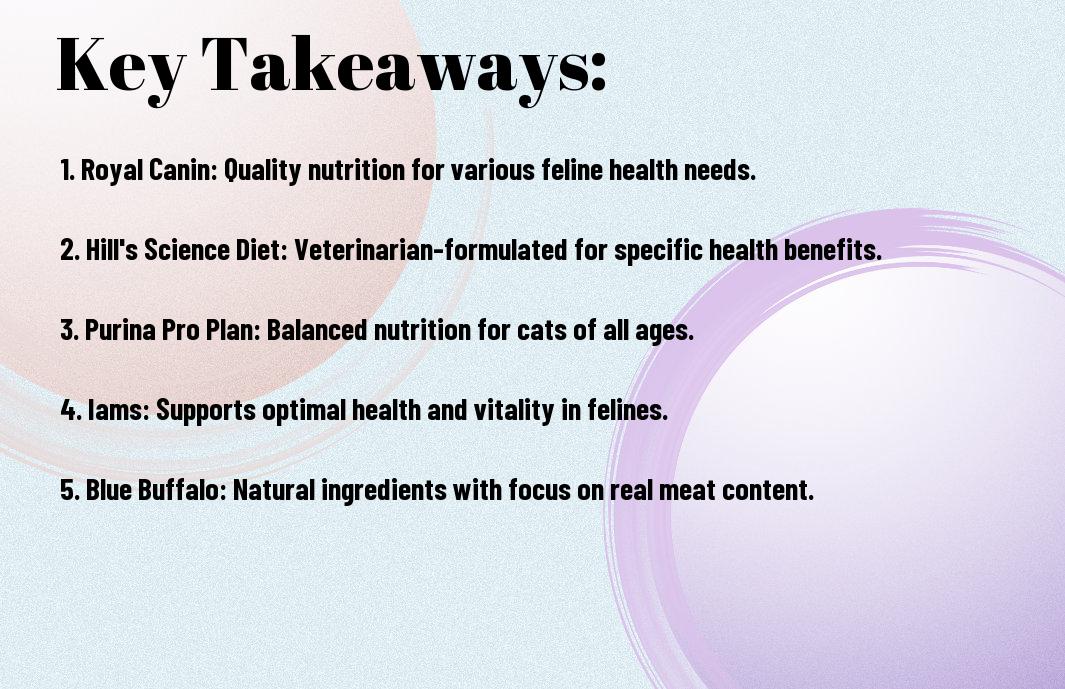
Overview of Nutritional Needs for Cats
Macronutrients: Proteins, Fats, and Carbohydrates
Little carnivores that they are, cats have specific dietary requirements that differ from other animals. Proteins are a crucial component of a cat’s diet due to their need for amino acids like taurine that are important for their overall health. Fats provide a concentrated source of energy that is important for maintaining a healthy skin and coat. Carbohydrates, although not a necessary component in a cat’s diet, can sometimes be included in commercial cat foods to provide energy.
Vitamins, Minerals, and Amino Acids
Carbohydrates are not important for cats as they are obligate carnivores, meaning they rely on nutrients found in animal tissue to meet their nutritional needs. Cats require a variety of vitamins and minerals to maintain proper bodily functions. These include vitamin A for vision, vitamin D for calcium regulation, and various minerals like calcium and phosphorus for bone health.
Understanding the nutritional content of cat food is crucial in providing your feline friend with a balanced diet. It’s important to consult with a veterinarian to ensure that the food you choose meets your cat’s specific nutritional requirements, as these can vary based on age, breed, and any underlying health conditions.
Brand #1: Royal Canin
Company Background and Reputation
Reputation: Royal Canin is a well-known and respected brand in the pet food industry. With over 50 years of experience, the company has built a reputation for producing high-quality, science-based pet foods that are recommended by veterinarians worldwide. Their commitment to research and innovation sets them apart from other brands, making Royal Canin a trusted choice for pet owners looking for premium nutrition for their feline companions.
Specific Formulas Recommended by Vets
Vets: Royal Canin offers a wide range of specific formulas tailored to meet the unique nutritional needs of cats at different life stages and with specific health conditions. Their Veterinary Diet line includes formulas designed to support cats with urinary issues, digestive sensitivities, and weight management needs. These formulas are not only backed by extensive research but also recommended by veterinarians for their efficacy in helping cats lead healthier lives.
Background: Royal Canin’s dedication to providing scientifically formulated diets that address the specific needs of cats makes them a top choice among veterinarians. Their commitment to quality and nutrition ensures that cat owners can trust Royal Canin to provide their pets with the crucial nutrients they need to thrive.
Brand #2: Hill’s Science Diet
Many veterinarians highly recommend Hill’s Science Diet for cats due to its reputation for providing quality nutrition backed by scientific research.
Science-Driven Nutritional Solutions
The Hill’s Science Diet brand prides itself on offering science-driven nutritional solutions for cats of all ages and health needs. Their formulas are developed by a team of veterinarians, Ph.D. nutritionists, and food scientists to ensure that each product meets the specific dietary requirements of cats.
Popular Vet-Recommended Products
Popular vet-recommended products from Hill’s Science Diet include their Prescription Diet line, which offers specialized nutrition for cats with specific health conditions such as urinary tract issues, kidney disease, and weight management. Additionally, their Science Diet line features a variety of formulas tailored to different life stages and dietary preferences of cats.
Understanding the importance of tailored nutrition for cats, Hill’s Science Diet has become a go-to brand for many veterinarians seeking high-quality and effective dietary solutions for their feline patients.
Brand #3: Purina Pro Plan
Range of Targeted Nutrition Options
Targeted towards specific feline health needs, Purina Pro Plan offers a diverse range of nutrition options to cater to various requirements. Whether your cat needs weight management, sensitive skin and stomach care, or urinary tract support, there is a specialized formula available to address those needs effectively. Purina Pro Plan designs their products with input from veterinarians and nutritionists to ensure the highest quality of targeted nutrition for cats.
Notable Vet-Recommended Lines
An exceptional feature of Purina Pro Plan is its vet-recommended lines that are trusted by professionals in the field. These lines are formulated to provide optimal nutrition for cats with specific health concerns such as gastrointestinal issues, renal health, and joint support. Vets often recommend these lines for cats with particular health conditions, showcasing the brand’s commitment to developing scientifically backed formulas that deliver results.
Understanding the importance of targeted nutrition for cats is crucial in maintaining their overall well-being. With Purina Pro Plan’s vet-recommended lines and a wide array of specialized formulas, cat owners can confidently provide their feline companions with high-quality diets tailored to their individual health needs. By consulting with a veterinarian and considering Purina Pro Plan’s offerings, cat owners can make informed decisions for their cat’s nutrition and overall health.
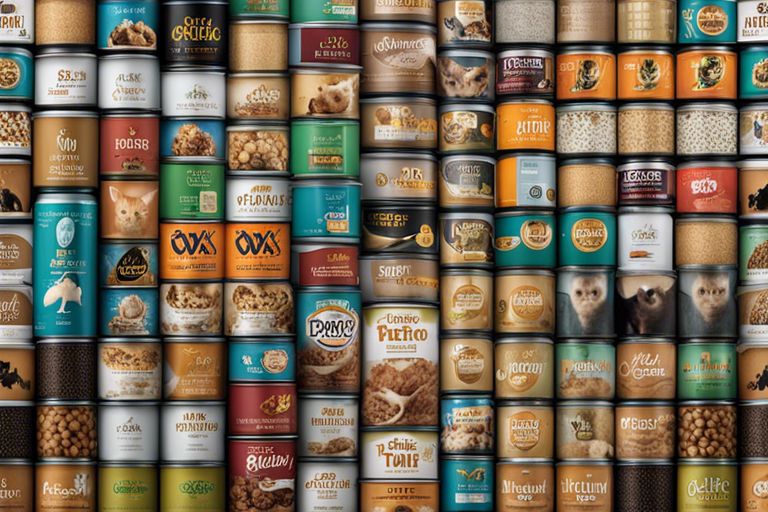
Brand #4: Iams
History and Nutritional Philosophy
For a brand that has been around since the 1940s, Iams has a long-standing reputation for producing quality pet food. With a commitment to providing pets with high-quality nutrition, Iams focuses on using real ingredients and necessary nutrients to support the overall health and well-being of cats.
Key Vet-Recommended Formulas
Iams offers a range of vet-recommended formulas that cater to different life stages and specific dietary needs of cats. Their formulas are carefully crafted to provide balanced nutrition, necessary vitamins, and minerals that are necessary for a cat’s optimal health.
Formulas such as Iams Proactive Health Adult Indoor Weight & Hairball Care and Iams Proactive Health Kitten are among the top choices recommended by vets for maintaining a healthy weight, promoting hairball control, and supporting the growth and development of kittens.
Brand #5: Blue Buffalo
The Natural Approach to Cat Food
Natural cat food is becoming increasingly popular among pet owners who want to provide their feline companions with the best possible nutrition. Blue Buffalo is a brand that prides itself on its natural ingredients, using real meat as the first ingredient in many of its recipes. Their formulas are free from by-products, corn, wheat, and soy, making them a great choice for cats with sensitivities or allergies.
Top Vet-Approved Choices
Blue Buffalo is often recommended by veterinarians for its high-quality ingredients and commitment to pet health. Their products are formulated to meet the nutritional levels established by the AAFCO Cat Food Nutrient Profiles, ensuring that your cat gets a balanced diet. The brand offers a wide range of options, including wet and dry food formulas tailored to different life stages and dietary needs.
Another reason why Blue Buffalo is a top vet-approved choice is their focus on natural and holistic recipes that prioritize the health and wellness of cats. With options for indoor cats, weight management, and sensitive stomachs, Blue Buffalo has a variety of solutions for common feline health concerns.
Considerations When Choosing Cat Food
Life Stage and Special Dietary Needs
After considering the top brands recommended by vets, it is imperative to think about your cat’s specific life stage and any special dietary needs they may have. Kittens, adult cats, and senior cats all have unique nutritional requirements, so it’s important to choose a cat food that is formulated for their specific life stage. Additionally, some cats may have special dietary needs due to medical conditions such as obesity, diabetes, or food sensitivities. Consulting with your veterinarian can help you determine the best diet for your cat’s individual needs.
Reading and Understanding Cat Food Labels
Any responsible pet owner knows that reading and understanding cat food labels is crucial when selecting the right food for their feline companion. An informed decision can only be made when you have a clear understanding of what ingredients are in the food. Look for high-quality protein sources like real meat, and avoid fillers like corn and by-products. Pay attention to the guaranteed analysis, which provides information on the minimum percentages of protein and fat, as well as the maximum percentages of fiber and moisture in the food.
The nutritional adequacy statement on the label indicates whether the food is complete and balanced for a specific life stage, such as growth, maintenance, or all life stages. This statement is typically found near the ingredient list and can help you determine if the food meets the nutritional needs of your cat.
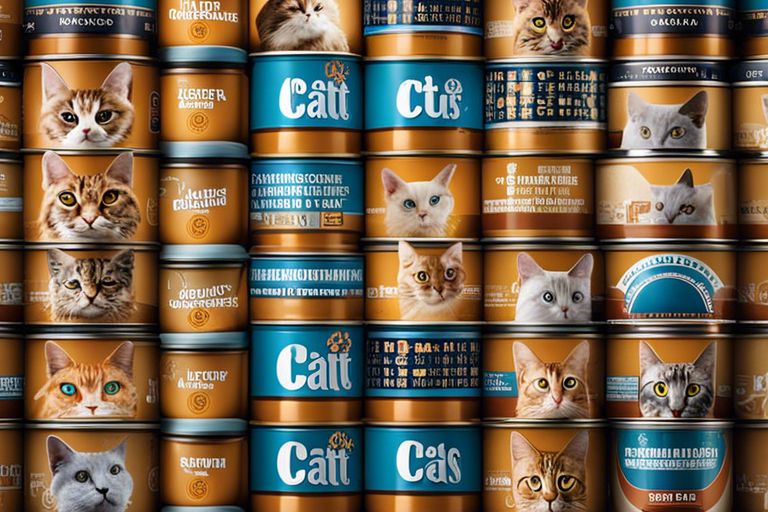
Common Myths and Misconceptions
To ensure your cat is receiving the best nutrition, it’s important to dispel common myths and misconceptions about cat food. Some beliefs around grain-free diets and homemade diets vs. commercial brands can lead to misinformation about what is truly best for your feline friend.
Grain-Free Diets and Health
On the topic of grain-free diets, there is a common misconception that they are always better for cats. While some cats may have specific dietary needs that require a grain-free diet, most cats can digest grains without any issues. In fact, grains can provide important nutrients and fiber that contribute to a balanced diet. Consult with your veterinarian before making any drastic changes to your cat’s diet.
Homemade Diets vs. Commercial Brands
An important debate in the world of feline nutrition is homemade diets versus commercial brands. While homemade diets may seem like a healthy alternative, it can be challenging to ensure that your cat is receiving all the necessary nutrients in the right proportions. Commercial cat food brands often undergo rigorous testing to meet the nutritional needs of cats at various life stages. If you choose to feed your cat a homemade diet, it’s crucial to work closely with a veterinary nutritionist to create a balanced and complete meal plan.
Another aspect to consider when comparing homemade diets to commercial brands is the cost-effectiveness and convenience. While homemade diets may provide a sense of control over ingredients, they can be time-consuming to prepare and may end up being more expensive than high-quality commercial cat foods that are formulated by experts in feline nutrition.
Additional Tips for Cat Health and Nutrition
- Unlike dogs, cats are obligate carnivores, meaning they require a diet rich in animal protein to thrive.
- Ensure your cat’s food is balanced and complete to meet all of their nutritional needs.
- Regularly check your cat’s weight and adjust their food intake accordingly to prevent obesity.
- Consult with your veterinarian before making any significant changes to your cat’s diet.
The Importance of Hydration
Additional to food, cats need constant access to fresh water to stay hydrated and support their kidney function. Cats may not drink enough water, so consider providing a mix of wet food and dry kibble to help increase their water intake. Dehydration can lead to serious health issues, so it’s crucial to encourage your cat to drink water regularly.
Supplementing Cat Food with Treats and Other Foods
Supplementing your cat’s diet with treats and other foods should be done in moderation. Treats can be an important tool for training and bonding with your cat, but they should not make up a significant portion of their daily caloric intake. Some human foods are toxic to cats, so always check with your veterinarian before offering anything new to your cat.
Healthier options for treats include small amounts of cooked meats like chicken or fish, or commercial cat treats designed to provide additional nutrients. Bear in mind, treats should complement your cat’s diet, not replace it entirely.
Final Words
With these considerations in mind, it is important to choose cat food brands that prioritize quality ingredients, nutritional value, and have been recommended by veterinary professionals. The top 5 cat food brands recommended by vets, including Hill’s Science Diet, Royal Canin, Purina Pro Plan, Iams, and Blue Buffalo, have consistently met these criteria and have been trusted by veterinarians to provide complete and balanced nutrition for cats of all ages and health conditions.
When deciding on a cat food brand for your feline companion, be sure to consult with your veterinarian to determine the best option based on your cat’s specific needs. By choosing a vet-recommended brand, you can ensure that your cat receives the imperative nutrients they need to thrive and stay healthy for years to come. Keep in mind, a proper diet is key to your cat’s overall well-being and longevity.
FAQ
Q: What are the top 5 cat food brands recommended by vets?
A: The top 5 cat food brands recommended by vets are Royal Canin, Hill’s Science Diet, Purina Pro Plan, Iams, and Blue Buffalo. These brands are known for producing high-quality cat food backed by science and recommended by veterinary professionals.
Q: Why are these brands recommended by vets?
A: These brands are recommended by vets because they prioritize the nutritional needs of cats and use high-quality ingredients in their formulations. They conduct research to ensure their products meet the dietary requirements of cats at different life stages.
Q: What should I look for in cat food recommended by vets?
A: When choosing cat food recommended by vets, look for options that have complete and balanced nutrition, are made from high-quality ingredients, and are free from artificial additives. Additionally, consider your cat’s specific needs, such as age, weight, and any health issues.
Q: How do I transition my cat to a new vet-recommended cat food?
A: To transition your cat to a new vet-recommended cat food, gradually introduce the new food by mixing small amounts with your cat’s current food over 7-10 days. This slow transition helps prevent digestive upset and allows your cat to adjust to the new food gradually.
Q: Can I consult my vet for personalized recommendations on cat food brands?
A: Yes, consulting your vet for personalized recommendations on cat food brands is highly recommended. Vets can consider your cat’s individual needs and any health concerns to provide tailored advice on the best cat food options for your furry friend.
